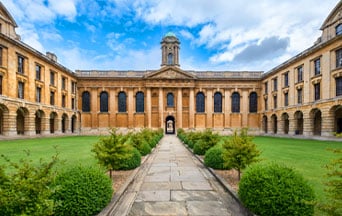
Many Catholics today are unaware of the immense contributions of the Ultramontanes of the nineteenth century to the resurgence of Catholicism worldwide. Prof. Fernando Furquim de Almeida (1913-1981) studied the Movement and produced dozens of articles detailing its work. We have edited these articles and will be featuring them. They highlight the actions of Ultramontane leaders in England, Spain, Italy, France and Ireland.
The Oxford Movement’s numerous conversions assured England’s Catholic clergy and laity had a high level of culture. Thanks to the Ultramontane activism inspired by Nicholas Cardinal Wiseman, Archbishop of Westminster, this academic culture allied itself with the purest orthodoxy.
However, maintaining this intellectual level required adequate schooling for new generations of Catholics. England’s two great universities, Cambridge and Oxford, were passionately Anglican. They erected many roadblocks to prevent the establishment of a new Catholic university.
The fact that the vast majority of Catholics were poor further complicated education issues. To provide at least an elementary education, a devoted layman, Charles Langdale, created the Catholic Poor School Committee. The committee managed to wrest a series of concessions from the government. This action allowed the rapid development of establishments for underprivileged children.
Since priestly formation depended exclusively on ecclesiastical authority, it presented fewer difficulties. Cardinal Wiseman’s efforts facilitated the complete remodeling of seminaries. To this end, the cardinal even resorted to exceptional measures such as appointing William Ward—an illustrious married convert—as professor of philosophy and dogmatic theology in his seminary. Candidates for the priesthood completed their formation at Rome’s English College.
Eternal and Natural Law: The Foundation of Morals and Law
However, Catholic university education was deficient, if not nil. Anyone wishing to gain a higher education was obliged to attend Protestant universities. Oxford and Cambridge were the leading sources of English culture, given their enormous prestige as well as their scientific and literary resources. As both had an officially Anglican orientation, the faith of Catholic students was clearly in danger.
On the other hand, endowing Catholic university schools in England was impossible because there would not be enough students to maintain them. Cardinal Wiseman had previously gained the assistance of the Irish for the foundation of the Dublin Review and the Catholic Institute of Great Britain. He again turned to them.
In Ireland, higher education had been the subject of significant differences of opinion, even within the episcopate. Much of this contention sprang from the creation of “Queen’s Colleges” in 1845. Sir Robert Peel, then Prime Minister, obtained from the House of Commons a law establishing non-denominational universities for the Irish. These colleges purported to be neutral.
However, the Irish received the “Queen’s Colleges” very poorly. They realized the government had established them because of the Catholic movement’s strength. The purpose of the colleges’ establishment was to avoid giving schools professing the true religion to Irish Catholics. The professors were mostly Protestants, further increasing the opposition because it contradicted the purported neutrality.
Nevertheless, a few Catholics thought it prudent to accept the law. At that moment, they saw the “Queen’s Colleges” as the only way to improve intellectual conditions in Ireland, hitherto trampled underfoot by the English.
The episcopate was also divided. Most bishops, accompanied by their clergy, refused the alleged benefit.
 Learn All About the Prophecies of Our Lady of Good Success About Our Times
Learn All About the Prophecies of Our Lady of Good Success About Our Times
However, Most Rev. Daniel Murray, Archbishop of Dublin and Most Rev. Paul Cullen, Archbishop of Armagh, along with four other bishops, deemed an agreement with the authorities possible. They sought to influence plans for the creation of “Queen’s Colleges” through negotiations with the English Viceroy.
In 1847, the sharp divergence between the two viewpoints forced the Holy See to intervene with a document from the offices of the Propaganda Fide. While recognizing their good faith, the paper condemned the position of the Archbishop of Dublin and his companions.
Nevertheless, the Archbishop of Dublin continued negotiating with the Viceroy.
In 1848, Most Rev. John MacHale, Archbishop of Tuam, was commissioned to bring to Rome a document in which nineteen of the country’s bishops deplored their dissident colleagues’ attitude. The latter tried to defend themselves, but on November 11, 1848, a new warning was issued against Archbishop Murray and the prelates that followed him.
Two years later, the Archbishop of Dublin again sought permission from the Holy See for Irish Catholics to attend Queen’s Colleges. Once more unsuccessful, he acquiesced and joined the majority of the episcopate, which had decided to create a Catholic university in Dublin.
Cardinal Wiseman then brought the support of the English Catholics for this initiative. He proposed that the Irish episcopate appoint Father John Henry Newman as rector of the nascent university. Most Rev. Paul Cullen, the new college’s leading advocate, accepted the suggestion.
Science Confirms: Angels Took the House of Our Lady of Nazareth to Loreto
For seven years, Father Newman tried to make the Catholic University of Dublin a reality. He failed for several reasons. These stemmed primarily from the radical differences between his and Archbishop Cullen’s conceptions of a Catholic university. Driven by his old experiences at Oxford, Father Newman wanted to conform it to the old, traditional English model. By contrast, Archbishop Cullen wanted to avoid any Protestant remnants in the formation of the university.
For his part, Father Newman showed little prudence by approaching the Young Ireland movement as soon as he arrived in Dublin. That movement had opposed the Irish Catholic politician Daniel O’Connell in that great leader’s later years. Young Ireland was viewed with suspicion by Mr. O’Connell’s former disciples, who rightly blamed the group for the split in the Irish Catholic movement.
The failed attempt at founding the university accentuated the bitterness that dominated Newman’s character, from which he never freed himself. This temperamental defect caused great damage to the apostolate developed by Most Rev. Wiseman and later by Most Rev. Henry Edward Manning.
Photo Credit: © kmiragaya – stock.adobe.com

